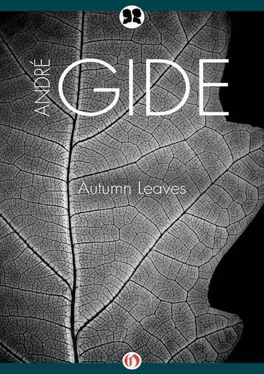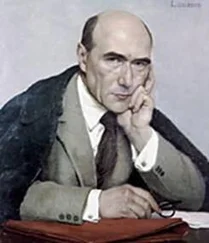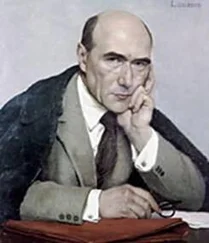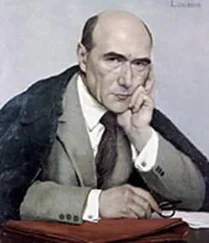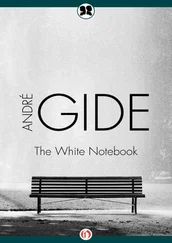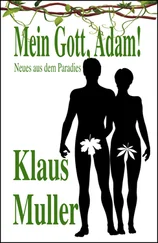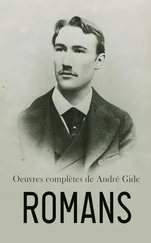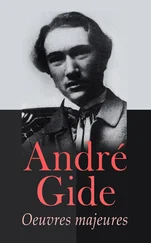The French title of Autumn Leaves , the collection of André Gide’s essays at hand, Feuillets d’automne is stamped with an allusion to Victor Hugo’s celebrated collection of poems, Les Feuilles d’automne in which the poet, still in his twenties, meditates on his future disappearance from the immense and radiant world, “monde immense et radieux!” Gide’s foliage gathers personal memories of family, friends, important moments and influences of his intellectual, moral and artistic development. Nature, Victor Hugo points out, rejuvenates itself, and so Gide’s pages revive time past.
The opening essay of the collection “Spring,” first published in 1941, one of the darkest years in French history, may be read metaphorically as a comment on the historical season rather than the actual season. “In my time (I mean at the time of my youth), it did not happen this way.” So reads the opening sentence. How “it happened” in the author’s youth, that is to say, the past, is the underlying subject matter of this collection.
“Youth” is the title of the second essay, and here the title is ironic. The setting is La Roque , a French “commune” near Lisieux in the Calvados region of Normandy, and the vignette is written in the manner of Guy de Maupassant, also born in Normandy. In 1896, Gide inherited the Château de La Roque-Baignard. 1In May of that year André, then 27 years old, but not 25 as he claims in the essay, was elected mayor by a huge margin on the first ballot. 2Robinet, the keeper of the estate who manipulated this election for his own future benefit, was perverse and dishonest. In French, the name “robinet” means a faucet, and the choice of this name for this estate keeper whose actual name was Desaunay, suggests the various goods that flowed through him and that he appropriated. How he misled his youthful master and how in turn Gide handled his job is the story recounted here.
The essay that follows, “My Mother,” completes the volume’s family memoir. Here André discovers that his father Paul Gide, a brilliant lawyer and an eminent Professor of Law, had made his wife, André’s all-powerful mother, feel socially insecure and inadequate. The actual thinking of his father remains unknown, and André notes that every soul carries many secrets to his tomb where they remain forever hidden.
Another group of essays has links, often-tenuous ones, to the development of Gide’s social consciousness and his stint as a fellow traveler of communist parties. “The Day of September 27, 1935” is a contribution to a work devised by Maxim Gorky inviting every writer in every country in the world to describe his/her actions on a given day, the whole to be printed in a collective work, A Day in the Entire World . September 27, 1935 is the date Maxim Gorky chose at random for his project. This essay was originally published upon Gide’s return from the USSR where he had given a speech at Gorky’s state funeral. Related to the same trip are his moving pages about Eugene Dabit, the proletarian author of Hôtel du Nord, Petit Louis, Faubourg de Paris and other popular and populist works who died of scarlet fever in the course of his trip to the USSR with Gide, and to whom his Retour de l’URSS (Return from the USSR) is dedicated.
“Acquasanta” is the name of a village in the Abruzzi region of Italy renowned for its sulphur spring. It recounts a sad encounter at a swimming pool with a local boy from a working-class family. At first, Gide fails to notice the boy is missing a leg. Upon inquiry, he learns the boy was the victim of an accident and an incompetent surgeon. The essay is dedicated to Jef Last, the Dutch translator of Gide’s work who also accompanied him to the USSR.
The title of the following piece, “Dindiki” is the name of Gide’s little pet animal ( Perodicte Potto is the scientific term for this primate). It is a nod to Africa 3and the full development stage of Gide’s social consciousness that led to his books Voyage au Congo and Retour du Tchad (“Voyage to the Congo” and “Return from Tchad”). 4Dindiki is a present from a village chief that appears in the first mentioned book. The author’s deep attachment to him, and also his inability to care for him properly, may well reflect the situation of Africa in its relationship to well-meaning but ineffectual Europeans.
As we take up Gide’s interest in aesthetics, let us note there are a number of essays about art. While music is not present here in spite of the fact that Gide was an accomplished pianist, there is material pertaining to painting, especially Poussin, Matisse, Picasso and others. An anecdote about the Swiss painter, Felix Valloton, is particularly amusing. It seems that Valloton often painted from a photograph, rather than from life. This was the case for the painting of Gide in Rémy de Gourmont’s Livres des Masques (“Book of Masks”). “Heavens, my dear Gide,” Valloton is purported to have said, “I never would have recognized you from my portrait” (p. 145).
Pages on Gide’s literary mentors, friends and colleagues constitute the greater part of this volume. Some are positive, others not. Let us begin with the negatives. The essay on the poet Francis Jammes, who spent time with him in Biskra, notes Jammes was too full of his own importance to be able to understand anyone else. He explains that he broke off his friendship with Henri Ghéon when he became insufferable after his conversion. Did Gide count himself among Lautréamont’s admirers or for that matter did he think highly of Surrealists? The essay on Lautréamont explains only why he refused his Surrealists’ requests for the preface at hand.
Maurice Barrès, handsome, in love with Toledo and Spain, and one of the leaders of the anti-Dreyfus cabal is the object of particular venom. Gide considers him an awful egotist who paid not the slightest attention to other eminent contemporary authors, including Jules Renard, Marcel Proust, Paul Claudel, Paul Valéry, and Jean Giraudoux. One day, while waiting for him in his library and taking down a volume of Byron’s works, he discovers that all the books were dummies. Instead of following Kant’s precept of always acting in such a way as to be willing for the maxim to be set up as universal law, he notes that Barrès is drawn only to the particular and relative. He even goes so far as to recognize Barrès’ lesson in Hitler (p. 201) and to assert that ravages of Barrès’s brand of relativism were being felt even among communists! “I do not think one can,” adds Gide, “ever compromise with the truth.”
Now for the positive! Gide affectionately describes three encounters with Paul Verlaine. The first when he visited him with Pierre Louÿs at the Broussais Hospital in Paris. The second, with the poet Henri de Régnier, and the third, a vision of the drunken poet, Place du Panthéon, heckled by twenty school children. He admires him not because of his drunkenness and other bad habits, but in spite of them.
Gide was prone to admiration, and this is abundantly reflected in formal essays devoted to his friend Joseph Conrad (whom he translated), Goethe, and Thomas Mann. Less reserved are the writings on his French colleagues, Stéphane Mallarmé, Paul Valéry, Alfred Jarry, Paul Léautaud as well as the journals of the period, Le Mercure de France (still published today), and La Revue Blanche . For example, we have here one of the best accounts of the famous Tuesdays. Protected from the noises of the city, its politics and intrigues, those attending the weekly gatherings in the little dining room of the rue de Rome that could at the most hold ten persons, cared not for honors and money, but for art and poetry. Mallarmé exercised a sort of priesthood whose values were sincerity and integrity, values that Gide adopted throughout his life, values he shared with Paul Valéry, in a friendship that lasted until Valéry’s death and gave rise to one of the outstanding correspondences of the 20 thcentury. The essay here was written in memoriam to his friend who died shortly before the end of World War II. The provisional government under General De Gaulle decreed national burial and Gide was asked to pronounce the eulogy that is reprinted in this volume. 5
Читать дальше
